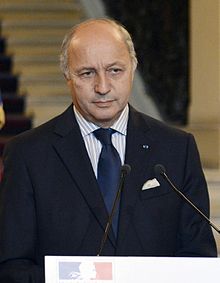The rapid and speeding escalation with which events are unfolding over Putin's invasion of Ukraine is now forcing many EU politicians to publicly backtrack on their covert support of Putin. But is this really so?
Previously,
- Merkel has spoken to [Putin] by phone three dozen times. Her Foreign Minister Frank-Walter Steinmeier, a member of the Social Democrats (SPD), traditionally a Russia-friendly party, has invested hundreds of hours trying to secure a negotiated solution to the conflict. ( Noah Barkin and Andreas Rinke: Reuters:
- M. Laurent Fabius, French Minister of Foreign Affairs and International Development, speaking about the Russian-French Mistral contract– "No. It’s a contract which was signed in 2011; it was another government, but it doesn’t much matter. There’s a rule which applies internationally as well as nationally: contracts which have been signed and, moreover, paid, must be honoured." (Embassy of France in London: 22 July 2014) (my emphasis)
 | |
| M. Laurent Fabius, French Minister of Foreign Affairs |
- Some EU politicians, such as Slovak Prime Minister Robert Fico and Hungarian Prime Minister Viktor Orban, have been openly scornful of sanctions and these countries are likely to push for an easing of sanctions next week. (Previous blog entry) (my emphasis)
 |
| Robert Fico, Slovak Prime Minister |
What is rather frightening is that Matteo Renzi, Italy's Prime Minister, has throughout this crisis been conspicuous by his TOTAL silence in condemning Putin's invasion of Ukraine. Let us not forget that Italy is one of the key economies of the Euro Zone, and that,
"Italy, now currently the Head of the Council of the EU, "has oodles of money invested in Russia, of which Putin is well aware. That is why Putin has said that he has “... high hopes that Italy will give a new impetus to the development of relations between Russia and the European Union”, as reported in Ria Novosti on the 17th April 2014." (Previous blog entry)
To the current Italian Head of the Council of the EU we can now add the 'fragrant' soft-on-Russia Italian, Federica Mogherini, EU Foreign Secretary.
 |
| The 'fragrant' Federica Mogherini Matteo Renzi |
Today, the 26th November, 2014, things seemed to have changed somewhat.
- The Czech Republic should not tell Ukraine what kind of future to choose, the former minister of foreign affairs, Lubomír Zaorálek, said on Tuesday, [25th November, 2014] hours after Czech President Milos Zeman said Ukraine should remain neutral and not join NATO. Speaking after a meeting in Prague with his Lithuanian counterpart, Linas Linkevičius, Mr. Zaorálek said Ukraine should itself decide in a sovereign manner on its future direction.
- Noah Barkin and Andreas Rinke report that, "Merkel has hit a diplomatic dead-end with Putin" (Reuters: 25th Nov., 2014) She is willing to continue with sanctions even though it will hurt German industry. At the same time, "Matthias Platzeck, a former leader of the [SOFT ON RUSSIA] German SPD, broke ranks earlier this month and urged Germany to recognize Russia's annexation of Crimea." (ibid Noah Barkin)
-
- France will not hand over the first of two state-of-the-art warships built for the Russians until Moscow halts its military action in Ukraine, the Elysée Palace has announced. (Kim Willsher: Tuesday 25 November 2014) (my emphasis)
- Yevhen Perebyinis, Ukrainian Foreign Ministry spokesman, told journalists that a total of 85 vehicles had been detected in the five columns that entered at the Izvaryne border crossing point from Russia on Monday. "Up to six of these were heavy armored transporters. The rest were vehicles and buses carrying [Russian] fighters and ammunition," he said. (Reuters:
Ministry of Foreign Affairs of the Republic of Lithuania)
| UN Gereral Assembly |
(my emphasis)


No comments:
Post a Comment